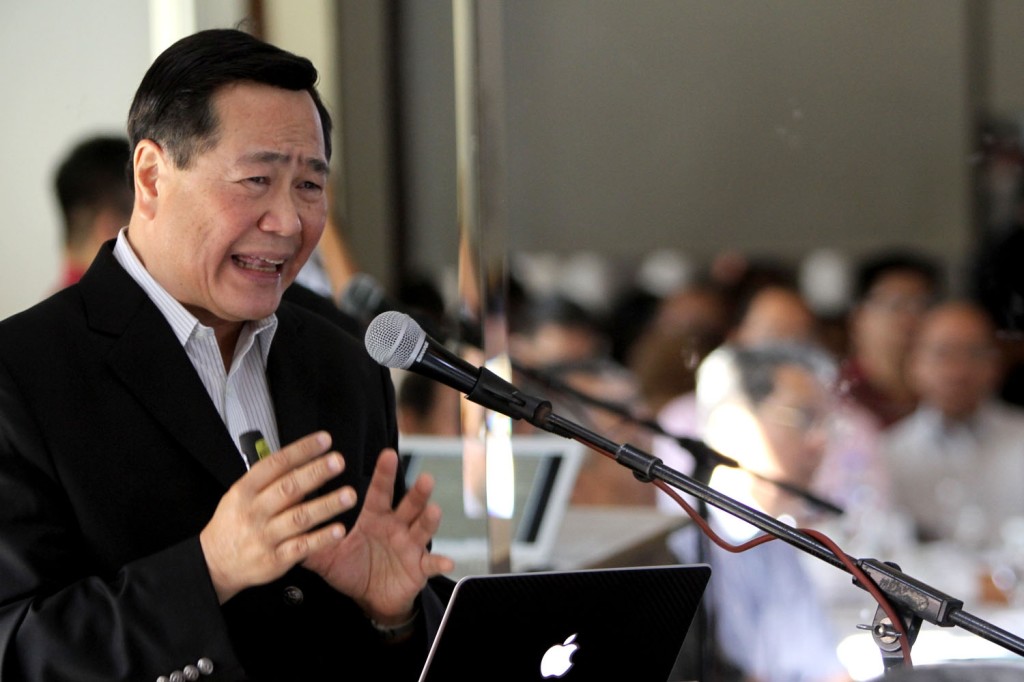Carpio: Duterte, Congress can’t waive PH rights over West PH Sea

Senior Supreme Court Justice Antonio Carpio talks about country’s stake in the West Philippine Sea during a forum in Club Filipino in San Juan City. INQUIRER PHOTO / RICHARD A. REYES
Supreme Court Associate Justice Antonio Carpio on Thursday said not even President Rodrigo Duterte or Congress can waive the country’s sovereign rights over the West Philippine Sea amid warming ties between Manila and Beijing.
Asked if the President could be breaking Philippine laws with his remarks and actions in connection with China, Carpio said Duterte should be careful in making “unilateral statements” as he is the one recognized to “bind the country.”
READ: Carpio book on sea row challenges China | Carpio hopes e-book on disputed seas reaches Chinese audience
“Because the ruling involves sovereign rights, it says the Philippines has exclusive sovereign rights over the West Philippine Sea, so the sovereign rights cannot be waived by the President or anyone. I don’t think even the Congress can waive that. Only the people can waive that. So if government officials waive that, it can be betrayal of public trust,” Carpio said in an interview with ABS-CBN News Channel’s Headstart.
Carpio was referring to the United Nations-backed arbitration ruling last year that invalidated China’s claims to almost all of the South China Sea and favored the Philippines based on the 1982 UN Convention on the Law of the Sea. He was instrumental in Manila’s filing of the case.
Since his election in May last year, President Duterte has forged a “recalibrated” foreign policy that veered away from dependence on the United States and shifted toward friendlier relations with China and Russia.
Duterte, who is facing an impeachment complaint filed by the Magdalo group over his alleged mishandling of the South China Sea case, has repeatedly said that the Philippines can’t match China’s military power.
But Carpio said the Philippine government should keep on protesting Beijing’s reclamation and militarization activities in the South China Sea despite the country’s relatively weaker military capacity. Beijing, which refused to recognize the arbitral ruling, continues to develop artificial islands in the Spratlys archipelago.
“If we are no match with China, we don’t have to waive it. You can insist even if you can’t physically get it but you must keep on insisting. Because if you waive it, it’s gone forever. The moment we concede our sovereign rights, we cannot take it back because China will never give it back. That’s why we have to be very careful,” the justice said.
He said, “We have many cards to play that are not confrontational.”
Carpio cited Vietnam, one of the claimant countries in the disputed seas, as a possible model for the Philippines. Hanoi maintains good trade relations with Beijing despite a strong stance in the maritime row.
“I would take the approach of Vietnam as the model because Vietnam is very strong in resisting China’s encroachment but they continue to have very strong trade relations with China. A lot of Chinese companies operate in direct export zones. It’s not an ‘either or’ because they were able to separate these issues and China would accept that,” Carpio said.
“If we adopt that attitude that we don’t want to displease China, we’ll never get back our exclusive economic zone. Every time China fortifies its claim, build something there, we will not displease China. It will end that way. We have to protest every act of China, any attempt to increase or enforce its claim,” he added.
Carpio has recently launched a book that questions China’s claims to the disputed seas, which he said he will distribute online in Mandarin so it could reach Chinese people. CBB/rga
For comprehensive coverage, in-depth analysis, visit our special page for West Philippine Sea updates. Stay informed with articles, videos, and expert opinions.